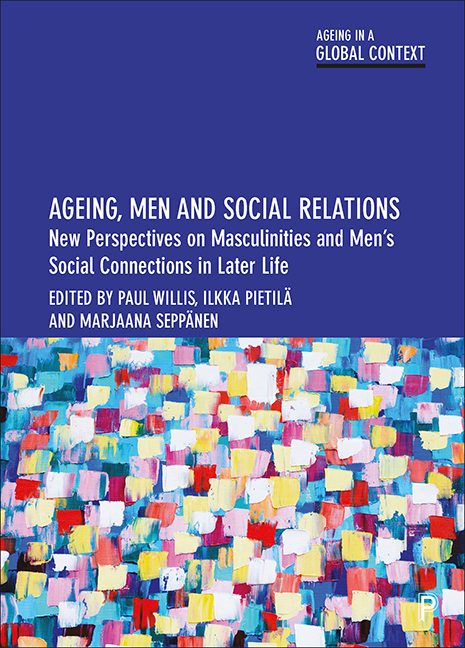 Ageing, Men and Social Relations
Ageing, Men and Social Relations Published online by Cambridge University Press: 18 January 2024
Introduction
In order to understand ageing men and masculinities in contemporary life, it is necessary to explore the complexity of their lived and embodied experiences of masculinity and how these are developed across their biographies and sociocultural changes. Critical studies on men and masculinities consider masculinity a category of gender that is socially constructed and that calls for a feminist perspective to analyse gendered power relationships. Using the plural ‘masculinities’, Connell (1995) underscores how the construction varies across time and place and within hierarchies of power. Bourdieu (2001) has examined how men’s positioning in relation to such power structures shapes male practices. However, research on ageing and gender has largely ignored the ongoing reconfiguration of old age that has been facilitated by postwar cohorts across many European and North American countries bringing their own dispositions and aspirations into retirement, and by not accepting the ascriptive passive status which previously defined ‘the old’ (Gilleard and Higgs, 2005). With a particular focus on the generational unit sharing political and cultural rifts around what has been termed ‘1968’, this chapter asks whether later life might constitute an arena in which the ideals of that era contribute to the construction of more egalitarian ageing masculinities. This perspective draws attention to the way masculinities are acted upon and enacted in the context of biography and the sociohistorical as well as cultural changes of people’s lives. The attention given to the 1968 era is based on the idea that its key characteristics, political dissent and social equality, have remained pertinent to gender equality politics, and provided a generation of young adults with the opportunity of breaking with or questioning taken-for-granted ideas of gender relations and care responsibilities. In this chapter a particular focus is given to the historicity of the 1960s and how it has rippled through into the construction of masculinities and gender relations in contemporary later life.
Age, gender, masculinities and hegemony
Feminist gerontologists draw attention to the fact that both gender and age are often naturalised and therefore seen as either an unchangeable binary category (gender) or an inevitable process of decline (ageing) (Arber and Ginn, 1995; Calasanti and Sleven, 2001; Denninger and Schütze, 2017).
To save this book to your Kindle, first ensure [email protected] is added to your Approved Personal Document E-mail List under your Personal Document Settings on the Manage Your Content and Devices page of your Amazon account. Then enter the ‘name’ part of your Kindle email address below. Find out more about saving to your Kindle.
Note you can select to save to either the @free.kindle.com or @kindle.com variations. ‘@free.kindle.com’ emails are free but can only be saved to your device when it is connected to wi-fi. ‘@kindle.com’ emails can be delivered even when you are not connected to wi-fi, but note that service fees apply.
Find out more about the Kindle Personal Document Service.
To save content items to your account, please confirm that you agree to abide by our usage policies. If this is the first time you use this feature, you will be asked to authorise Cambridge Core to connect with your account. Find out more about saving content to Dropbox.
To save content items to your account, please confirm that you agree to abide by our usage policies. If this is the first time you use this feature, you will be asked to authorise Cambridge Core to connect with your account. Find out more about saving content to Google Drive.